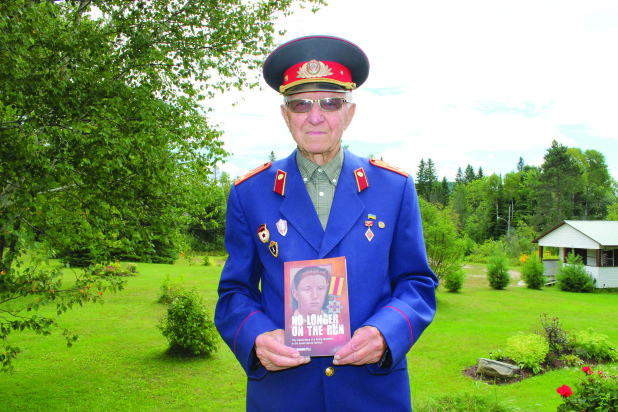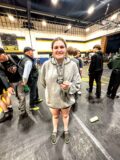Archive » Headline News » News
Ex-Soviet spy breaks 50 years of silence in new book
September 3, 2014

By Nate Smelle
When Hastings Highlands Councillor Lorraine Fell began speaking with her long-time neighbour on Baptiste Lake Andy Klashenko about his life story she had no idea the kind humble man next door was once a spy for the Soviet Secret Service. For more than 50 years Klashenko kept his role as a Soviet spy during World War Two a secret from his family and friends. Last year he broke his silence in a series of conversations with Fell which she has since released in her first book No Longer On The Run: The Untold Story Of A Young Ukranian In The Soviet Secret Service.
“I think the atrocities that took place are something that everybody needs to be aware of,” Fell said.
“The only way to really stop it is for everyone to be aware of it, and to know how it got started.”
Klashenko and Fell were at Leon’s in Bancroft for a book signing on Saturday, Aug. 30. Daria Rudzitis showed up at the book signing for a chance to speak with the dynamic duo in person. Being of Ukranian descent she is interested in learning more about this dark chapter in history. Like Fell, Rudzitis also sees value in sharing such stories.
“The younger generation are cold to it, because they see so much violence,” said Rudzitis.
“They need to realize war is not a video game.”
Klashenko wants to tell his story because he also appreciates the importance the lessons he learned from his experience. In his living room, Klashenko shared some of this wisdom in a conversation with Bancroft This Week on Wednesday, Aug. 27. In great detail he recounted some of his most painful and formative memories.
As awareness of the growing threat in Adolf Hitler’s Nazi Germany spread throughout the world in the late 1930s, Klashenko said the people living in the Soviet Union had more than one monster to fear. Under their leader Joseph Stalin’s rule more than seven million people were kidnapped and murdered.
Klashenko’s father was one of them.
“One night Stalin’s police came in and took my father away, and that was it,” Klashenko said.
“It was 1938…March 8. He was taken away and I never saw him again.”
In the middle of the night while the family slept Stalin’s secret police abruptly burst into the Klashenko’s house, trashing many of their belongings and kidnapping Klashenko’s father.
Years later Klashenko was approached by two Soviet officers who he had not met before. It was at this time he was recruited him into secret service to help spy on the Nazis. Noticing the ideal lookout from the third storey of Klashenko’s grandfather’s windmill they had Klashenko (who was 14 at the time) keep watch on the German army as they began to occupy the area. For a while he was able to evade capture, however, eventually Klashenko’s luck ran out and he was taken prisoner. He remembers this day vividly. Looking out the front window of his home he could see the rifles of on the shoulders of the Nazi soldiers marching his way.
“I had a way out always,” he said.
“I had a ladder so when I would see them coming I would climb the ladder quickly up on to the roof and there was a hole which I made that I would slide down. Then I would run down into the woods. I made it many times but this time I was too late. I ran to the ladder to go up and I almost made it up top and one of them knocked the ladder out and I fell down. They took me on a truck and a then a train, and that is how I got to Germany.”
He spent the next two years forced to work in a Nazi labour camp. Like the other prisoners he was made to wear a label pinned to his chest. Assigned to work on Hermand and Dora Vugelsang’s farm in Syke Germany, he and the other prisoners had to walk back to the camp every night where they were locked up in their cell until morning. During his imprisonment Klashenko came to know and love the Vugelsang family as his own. They fed and cared for him as best they could without endangering their own safety under the Nazi’s fascist regime.
For instance, when Klashenko would share dinner with the family he would have to sit at a separate table in case someone reported the Vugelsang’s for being too hospitable to a prisoner of war.
This was not the only time the family put themselves at risk on behalf of Klashenko. One night when Klashenko didn’t make it back to the camp in time for lock-up, his captors came looking for him. When they arrived at the farm and found Klashenko still there Hermand came to his defense. He told the officers that he had asked Klashenko to stay in the barn to look after a cow that was having trouble giving birth.
When the British came into the labour camp and released the prisoners, Klashenko went to see a friend of his on a neighbouring farm. As he walked along the road he heard a shot come from the bushes. Investigating the origin of the commotion was a German soldier who had been shot in the foot lying on the ground, standing over him was a British soldier with a rifle and a bayonet. With his eyes filling up with tears Klashenko calls what this soldier did next as the greatest lesson he learned during the war.
“All of a sudden he dropped his rifle and went to his knees and started crying,” said Klashenko.
“When I went down to see him he said I couldn’t shoot him. When I saw him, he was 16-year-old and I saw my son back in England. Two people, so different who were supposed to fight and just imagine, he said he saw his son instead of an enemy.”
Rather than killing the wounded enemy soldier the British soldier called in a medic to treat him. A few days later the war was over.
After being liberated from the camp by British soldiers, he suffered from Post Traumatic Stress Disorder (PTSD) for more than 20 years. For many years he dealt with his condition on his own, with the help of his doctors and a therapist he has since been able to cope with the PTSD.
“The worst part of it was the bombs falling all around you, fires everywhere and you couldn’t get out,” said Klashenko.
“For a long time I didn’t want to go flying in an airplane or do anything like that. I couldn’t stand it.”
Out of fear for the safety of his mother and sister living in Kiev he did not contact them for 16 years after being freed. When Stalin died Klashenko immediately contacted his family. In spite of all of the hardships and injustices he has faced in his life, Klashenko still considers himself lucky.
To hear more of Klashenko’s incredible life story pick up a copy of the book, No Longer On The Run: The Untold Story Of A Young Ukranian In The Soviet Secret Service on sale in Bancroft at Ashlie’s Books and the Bancroft Times. It can also be purchased online at www.wallbridgehouse.com.
Look for Klashenko and Fell at the Bancroft Public Library for a book signing during Ontario Public Library Week this October.
















